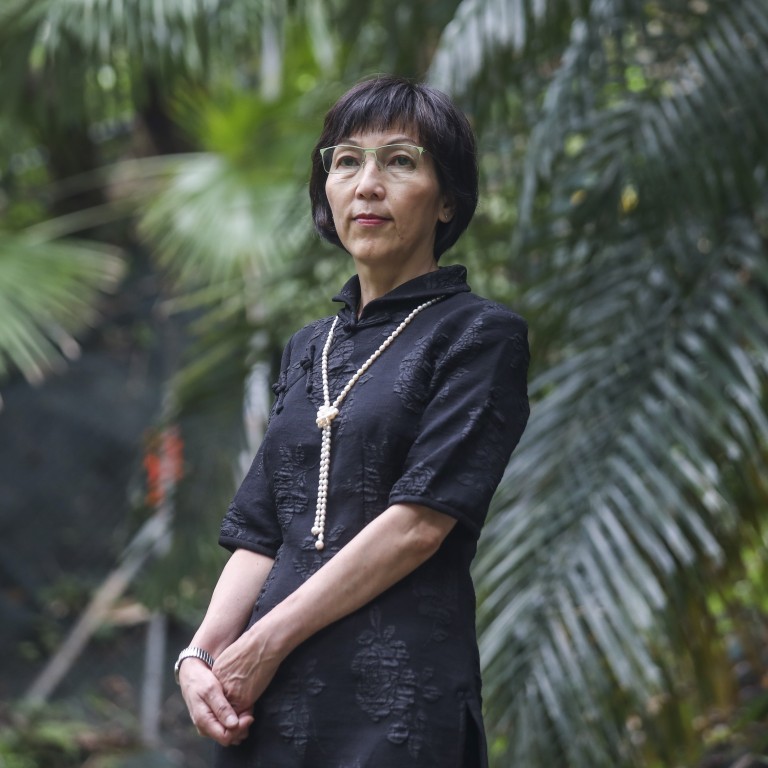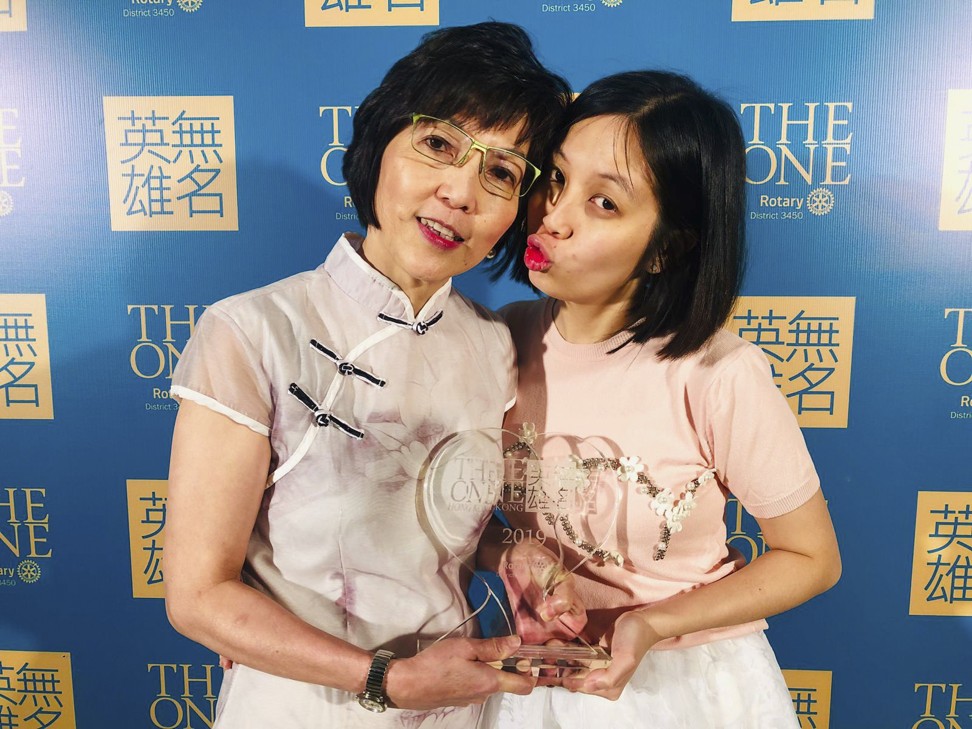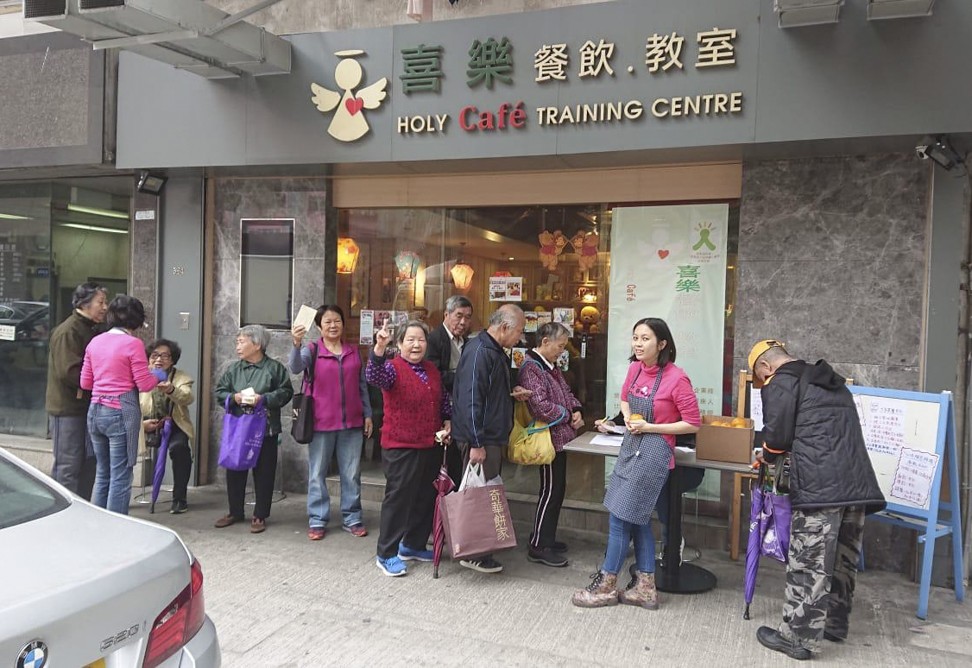
Maria Sung’s autistic daughter couldn’t find a job, so she opened a cafe to employ people with learning disabilities
The owner of Cheung Sha Wan’s Holy Café, which employs people with learning difficulties, and winner of the 2019 One Hong Kong Humanitarian Award, on how her daughter’s struggles inspired her to launch the initiative
Small wonder I was born in 1959. I was a premature baby. When my mother was seven months pregnant with me, she was rushed from our family home in the fishing village of Tai O to St Paul’s Hospital. I was born weighing just three pounds (1.4kg) and spent my first three months in an incubator.
I grew up in Tai O. We lived in the old town close to the river. Tai O in those days had no electricity – we burned firewood for the stove and used oil lamps at night. We didn’t have a telephone, there was just a radio. I have an older brother and a younger brother. My father was an architect and our family was reasonably well off, but that all changed when I was nine. My dad was a heavy opium smoker and ended up spending all his money on the drug, then he abandoned our family and went to live on Hong Kong Island.
Learning the hard way I went to a Catholic school in Tai O. When I finished primary school, it was expected that I would stop going to school and that my brothers would continue their education. That was the tradition at the time. After finishing school, aged 12, my mother got me a job working at a Tai O factory making light bulbs. I worked in the factory 10 hours a day and was paid HK$10 a day. A lot of my classmates worked in the factory, too. Most of the girls just wanted to get married, but I wanted to do something more.
When I was 15, the Tai O Primary School began running secondary school education in the evening. I decided to take the night classes. I finished work at the factory at 7pm and at 7.15pm the night school started. After a year, I started coughing up blood. I had tuberculosis, which was common in Hong Kong at the time. I was admitted to the TB hospital in Wan Chai, the Ruttonjee Sanatorium, and stayed there for six months.

A helping hand My mother’s elder brother was left in charge of taking care of the family. He ran a laundry shop and my mother helped him out. My grandfather ran a small convenience store and I helped him in the shop. My grandmother had a job taking oil and rice from the village up the hill to the monks at Ling Yan temple. I helped her carrying the bags of rice, which were really heavy. They weighed 30kg. There was a small garment store in Tai O where my mother got a part-time job embroidering the fabric that would be made into cheongsams for the women who worked in nightclubs. She brought the fabric home and worked on it in the evenings and I helped her out.
Sick and tired When I was discharged from hospital, I went back to night school, and when a new secondary school opened in Tai O (in 1977) – the Buddhist Fat Ho Memorial College – I began going to night school there. When I was in Form Four, I got a job as an office assistant in the Correctional Services office in Tong Fuk, on Lantau Island. The demands of working and studying became too much for my body and my TB returned. I had to give up my studies for the sake of my health.
I met my husband, Paul William Sung, at work. We dated for less than a year and got married in 1986. We moved into the Correctional Services married quarters on Lantau. Three months later I was pregnant with my first child, but I had a miscarriage. I soon fell pregnant again, but the doctor said I was at risk of miscarriage again, so I was confined to bed for six months.
Life and death During my pregnancy, my husband was diagnosed with liver cancer and was told he only had six months to live. He asked me to have an abortion. He thought that if I didn’t have a baby, I would have a better chance of remarrying and having a good life. I was determined to keep the baby. Six months after our daughter, Flora, was born, my husband passed away. I had to quit my job to look after Flora, which meant I needed to move out of the married quarters. I moved to Ho Man Tin to live with my mother-in-law.
As a widow, I received my husband’s retirement fund of HK$450,000 from the government. It was to be divided three ways, between myself, Flora and my mother-in-law. When the money from my husband’s retirement fund came through, I moved out with my two-year-old daughter and used the money to get a mortgage on a flat in Sham Shui Po. My daughter went to school and I got a job in ParknShop stock taking. Flora often got fevers and had muscle spasms and was in and out of hospital. It soon became clear she had learning difficulties, she had trouble speaking and was bullied at kindergarten.

In 2006, I opened a stationery shop in Lai Chi Kok. Because I employed two students with learning difficulties, I was given an NGO licence. I ran it until 2009. Flora got a job in a factory packing toys and earning HK$50 a day. The pay was terrible, so she quit and focused on her dancing group and returned to the skills training school. However, an incident there (which Sung prefers not to talk about) led her to lose her trust in people.
I went with her to a number of job interviews and although she was usually fine in the interview, when she got the job, she would often lose her temper. She didn’t work for two years. It was during this time that I got the idea to run a cafe – I wanted a place where I could work and have Flora work alongside me.

Bad business I sold my flat, we moved into government housing and, in 2011, I took over a business in To Kwa Wan. I’m Catholic and one day I was in church and thinking about what to call the cafe. The pastor was talking about joy and happiness – in Cantonese that is “hei lok”, which sounds like “holy”, so I decided to call it Holy Café. We ran that cafe for two years, but it wasn’t doing well. I put in the money and had others run the cafe, but I wasn’t happy with how they run it. They didn’t treat the special-needs staff well. So, I decided to part with this and open another cafe in 2013, in Cheung Sha Wan.
I employed people with learning difficulties as well as those without. After a while, the normal workers demanded more money, so I let them go and took over their jobs to cut costs. My daughter and I started working in the cafe at 7am, serving breakfast, and we employed two men with learning difficulties to help with the lunch period. When we closed the cafe at 7pm, Flora and I would take a trolley to Sham Shui Po market to buy produce. We worked hard, but business was bad and at one point I had just HK$5,000 left in my bank account. I decided it was time to close the business.
Holy spirit I still had the NGO licence from the stationery shop, so I decided to use it – and the government funding that came with it – to open another cafe employing people with learning difficulties as well as those without. I opened the third Holy Café in Cheung Sha Wan, in 2017. The cafe is homey. We have a lot of regular customers who are kind and caring. When customers go on holiday, they often come back with gifts for the special-needs staff. It’s like a family.
Last year, Chief Executive Carrie Lam came to the cafe and, after that, we got a lot of attention. We even get people who come from overseas and want to volunteer. I hope to expand the cafe and offer more opportunities for those with intellectual disabilities. I’d like to open more outlets.

